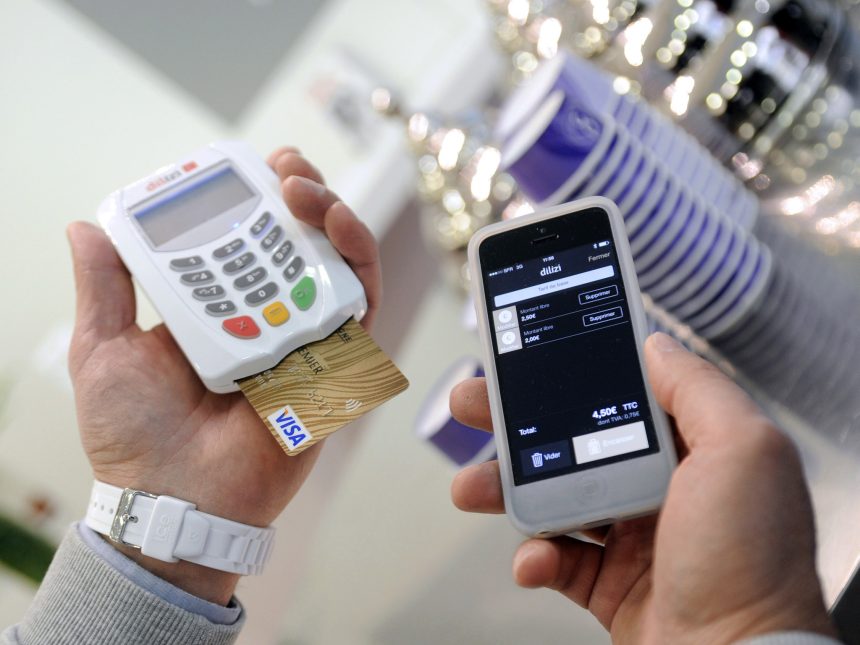Here’s my dream scenario:
To walk into a store with no cash in hand, select an item that I want to purchase, walk to the counter and pay with my debit card or tap my phone on a console without any cash exchanging hands.
Of course, some readers might read that and think that it already happens, but in a country like Ghana, where cash is still king, we still have a long way to go before the vision of a true cashless society emerges. Thankfully, payment apps like ExpressPay and Slydepay are trying to speed up the cashless revolution process. Institutions like GHIPSS (Ghana Interbank Payment and Settlement Systems) are also working hard to make cashless transactions easier for the average citizen.
With all this progress happening, is Ghana’s cashless revolution around the corner or is it far off into the future?
The End of Cash is at Hand?
From my casual observation in Ghana, especially Accra, the use of cash is still very prevalent amongst buyers, especially in stores and marketplaces.

People still troop to the banks at the end of the work month, some with cheques in their hand, to either withdraw or deposit money into their accounts. I’ve seen people walk out with bundles of cash in plastic bags like they’re heading to a drug deal (Sorry, couldn’t help it).
It could just be observations and confirmation bias but it seems to me that many Ghanaians still rely on cash for most of their transactions. But according to data, the use of cashless options like Mobile Money seems to be making big strides. (Raw Africa)
But how many of those transactions are people buying items and not simply money transfers? It’s great that Mobile Money is taking off but are other options like credit and debit card payments taking off? If not, why are Ghanaians reluctant to use their cards more often for purchases?
Bad Experiences With Debit Cards
Maybe this has happened to you: You used your debit/ATM card to pay for something and when you checked your notifications from your bank, you noticed that there was a double debit on your account. Basically, you were charged twice for one purchase. You tried to call your bank to fix the problem and they took forever to refund you the money.

This has happened to a lot of people and the apprehension to make use of debit and credit card for purchases still exists for many people. For transactions, cash seems to the best resort. You don’t have to worry about getting charged twice or any of the other disadvantages when it comes to using credit/debit cards.
But when will this apprehension of using cards online or in stores be alleviated for the average Ghanaian? Would it take drastic measures by government and businesses to restrict the use of cash so people are forced to use their cards for transactions?
Mobile Money To The Rescue?
Good old mobile money. It’s here to stay. I was not the biggest fan of mobile money to be honest. I would rather walk into a store or restaurant and pay for stuff with my debit card than use mobile money for a transaction.
But there have been a few scenarios where Mobile Money worked for me. If someone needed to pay me for a job I did, they would just send me the money using mobile money. I have paid mechanics through mobile money for car parts to get my car fixed.
But at what point does Mobile Money become defacto? I don’t carry large amounts of money in my mobile wallet. That’s what my debit card is for. Maybe the day that Mobile Money can somehow be linked to my bank account, I might use it as default. But until then, I think I’m sticking with my debit card.
NFC Payment
Right now, do you know if your smartphone has NFC?
Hold on. Let’s take a step back for a minute. First of all, what is NFC? NFC stands for Near Field Communication. It works wirelessly and allows modern smartphones to send information to third parties and it works by simply placing your phone to other devices which have NFC readers.
Airtel courageously tried NFC payments with KFC. It doesn’t seem to have fully taken off but it was still a good attempt.
The rest of the world seems to be jumping in with NFC payments. Apple and Samsung Pay are have been using it for their products namely Apple Pay and Samsung Pay respectively. These products give owners of Apple and Samsung devices the option to add their bank accounts and cards onto their phones and pay for items simply by tapping their phones at NFC readers in businesses and store.
So can NFC be the future of payments in Ghana?

I say not yet but I’m quite hopeful. The scenario of simply tapping a reader when I get to the front of a counter and paying for items from a store brings my anxiety levels down to their barest minimum. My smartphone is in my hand most of the time and that’s convenient.
But there’s an alternative and that’s QR Payments. Ecobank and Mastercard have already started implementing that. Visa launched their mVisa platform in Nigeria and I wouldn’t be surprised if Ghana isn’t too far behind.
Crowdfunding In The 21st Century
Crowdfunding in the 21st century appears to have gotten easier because of cashless payment. It’s so easy now to set up online accounts on Kickstarter or GoFundMe for a personal project or something bigger. But how is Crowdfunding doing in Ghana especially with cashless? (Wrote a small article about Crowdfunding in Ghana ).
Some may ask about the altruism of Ghanaians and whether you actually help out especially with handouts for projects. If not, can Design Thinking fix that?

At a recent forum discussing Fintech and crowdfunding, Enock Takyi Dade, a card services specialist from GHIPSS, talked about using the design thinking approach in a side project he’s working on for crowdfunding. Most of the solutions that came out from the forum followed themes of using cashless approaches (especially mobile money) for crowdfunding. Another theme which also came up was building “trust” in the crowdfunding system for people to contribute freely and willingly without fear of their money going into the wrong hands.
But the question still remains: How altruistic are Ghanaians and will a cashless system be the answer to provide funds for crowdfunding?
M-Pesa Is Taking The Lead In Cashless Revolution
Kenya appears to be leading the pack when it comes to going cashless and they’re doing it through mobile money. M-Pesa is now coming out with a new product called M-Pesa 1 Tap. It is a Tap and Go payment method, similar to NFC, for paying for goods and services.
Payments are done using a Card, Wrist Band and Near Field Communication (NFC).
Safaricom employees have been piloting this product internally, using an NFC card for purchasing meals at their cafes.
The process is pretty simple. All one has to do is use their NFC card or NFC stick, tap on a POS machine and then enter their M-Pesa PIN when prompted on their phone to complete payment.

Some of these POS devices are small and make for easy mobility, especially for merchants on the move.
Is The Cashless Revolution Already Here?
At the moment, I’m trying to do my purchases using only my debit card. If I buy something from a store, I’m asking for a Point Of Sale device to purchase. I’m frankly tired of using cash.
Of course, I still have to pull out cash at certain places. At the petrol stations, I still have to use cash to pay the attendants for my fuel. I am aware some fuel stations (like Shell) offer card payment systems and that is a great start. I’m also seeing other places where you can use mobile money. But whether the user experience is good and quick enough is another thing altogether.
I’ll admit that paying for scratch cards is almost a non-starter for me now. With expressPay and my banking app, I hardly buy scratch cards on the street anymore. I’m also moving to the point of paying for my internet service using the expressPay app instead of physically going to the store to do it. It helps me save on petrol AND stress. The overall goal for me is convenience and I get that satisfaction using cashless transactions.
But I would be considered someone who is very techy. I wonder how other people are adopting technology for cashless payments. What do those numbers look like? Are people aware of all these technologies to make their life better? Are businesses pushing for customers to use their debit cards and mobile money wallets to make purchases?
I honestly don’t see much of that but I may be wrong.
Maybe the cashless revolution is already here but it’s not being discussed as much. Or maybe people still hold on to cash because it’s still more reliable than trusting an online system. Perhaps we’re going to have to wait a bit longer before our cashless revolution comes.












